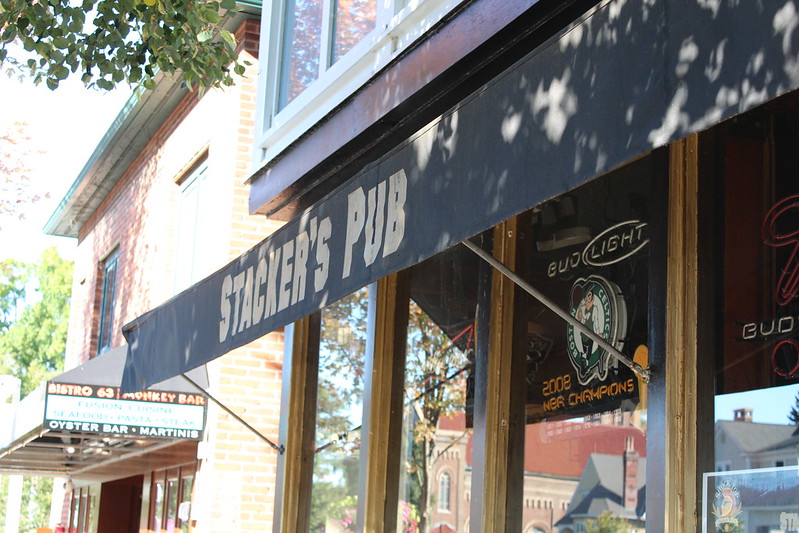Continuing our trend from last spring, COVID-19 hit the University of Massachusetts hard during the first week of classes. As of August 18, the Town of Amherst reinstated a town-wide mask mandate for all indoor spaces that are open to the public with no provision for capacity limits. This order was designed to reduce the spread of the virus, with respect to the reopening of local colleges and bars.
McMurphy’s Pub, Stacker’s Pub and Monkey Bar reopened this month after more than a year’s hiatus, with the expectation that UMass and other Five College Consortium students would bring in significant revenue. All things considered, it’s no surprise that local bars found a loophole; Customers required to wear masks upon entry could remove them and congregate per usual after ordering a drink. As long as a customer had a drink in their hand, they were free to dance and walk around without a mask.
This workaround was short-lived, however, as the Town revised its mask order to close the loophole on September 10. They changed their wording to “ensure mask wearing for patrons in bars, venues, and restaurants at all times, except when seated and eating or drinking.” This order was without a doubt targeted at local college students.
Many of us see the vaccine as the end of the pandemic, or the long-awaited return to normalcy. Members of the UMass community dutifully put their lives on hold, with the promise they could return to all of their favorite pastimes once they got the shot.
In the words of Ann Becker and Jeffrey Hescock, co-directors of the UMass Public Health Promotion Center, “the vaccines are working as designed — they prevent severe illness and hospitalizations.” This falls in line with the University’s decision to continue with the semester in-person, but I struggle to reconcile this with the town’s decision to curb nightlife.
It reads as though the privilege of returning to normalcy only applies to some. The University is a multimillion-dollar corporation and is permitted to resume all operations, including crowded, maskless dining commons, packed indoor activities expositions and 300-student lectures. As a result, local businesses like Stacker’s and McMurphy’s are struggling to stay afloat. With money comes power, along with strict legislations that apply to local bars but don’t apply to UMass.
The University’s status as an academic institution is another possible explanation for this discrepancy. Bars and clubs are dedicated to providing students a safe place to party and socialize so they are written off as unimportant, relative to educational institutions. Who decided on this hierarchy?
In light of recent accusations of sexual assault against fraternities nationwide, providing students a safe place to congregate off-campus is essential. Bars are equipped with paid staff, including bartenders who offer safe drinks and bouncers who watch out for physical misconduct. Placing restrictions on bars encourages students to find an alternative destination to party rather than curbing that behavior altogether. As a result, many students turn to fraternities.
Students are likely to party regardless of restrictions because social gatherings are vital for student success and enjoyment while at college. More than 18 months into the pandemic, we have enough data to acknowledge that social isolation can lead to suicide, and it is young adults who are most at risk. Engaging with these social gatherings is a calculated risk for many students, and while staying at home may be beneficial to their physical health, it can be very detrimental to mental health. We would be remiss to pretend that engaging in nightlife is devoid of value, especially in a highly-vaccinated community with only a singular (released and recovering) hospitalization on record. I see no reason to bar students from it.
The Town of Amherst dishes out inconsistent COVID regulations based solely on privilege. If UMass is allowed to fully reopen this semester, citing the vaccine as justification, why can’t the same logic apply to bars and nightclubs?
Will Amherst restrict students’ hobbies forever?
Julia Oktay can be reached at [email protected]. Follow her on Twitter @julia_oktay.




















Echo Greyback • Sep 23, 2021 at 12:10 pm
I mean considering the fact that UMass Amherst and the town of Amherst are separate entities, the town of Amherst is justified to do whatever they feel will protect their community. Just because UMass decided to reopen fully doesn’t mean that bars and clubs should also. COVID cases across the United States including Massachusetts are seeing an influx of positive COVID cases (despite high vaccination levels) and I’m sure UMass is no exception with their loose mask rules. So I don’t think Amherst is changing mask mandates on the basis of privilege and to make student’s lives harder. Its probably to protect their community from young superspreaders. And honestly a good idea because hospitals are facing higher levels of patient influx and low daily staffing.